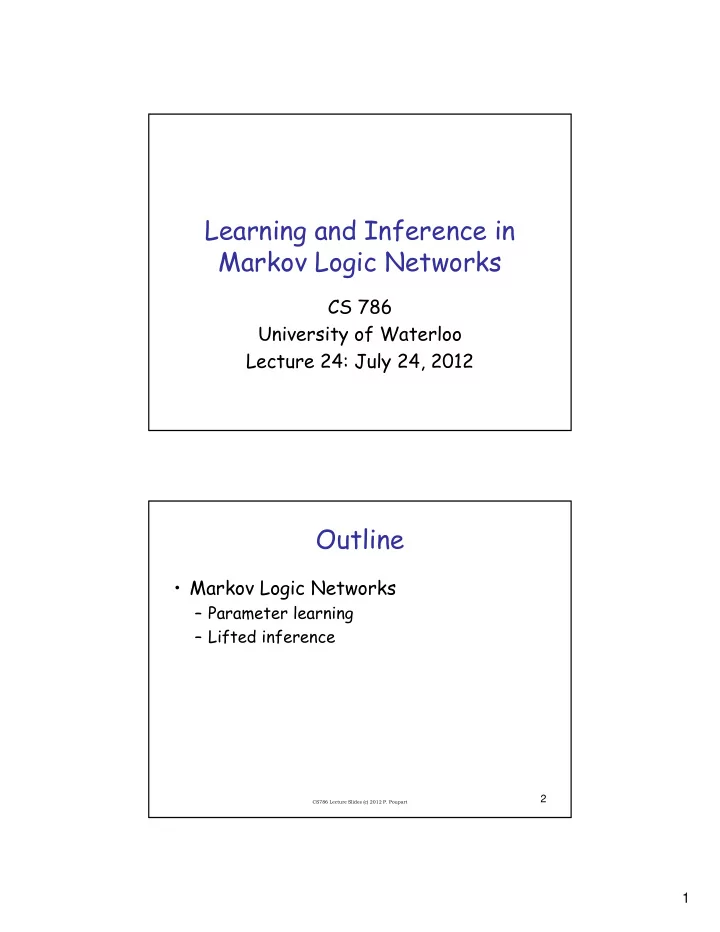

Learning and Inference in Markov Logic Networks CS 786 University of Waterloo Lecture 24: July 24, 2012 Outline • Markov Logic Networks – Parameter learning – Lifted inference 2 CS786 Lecture Slides (c) 2012 P. Poupart 1
Parameter Learning • Where do Markov logic networks come from? • Easy to specify first order formulas • Hard to specify weights due to unclear interpretation • Solution: – Learn weights from data – Preliminary work to learn first-order formulas from data 3 CS786 Lecture Slides (c) 2012 P. Poupart Parameter tying • Observation: first-order formulas in Markov logic networks specify templates of features with identical weights • Key: tie parameters corresponding to identical weights • Parameter learning: – Same as in Markov networks – But many parameters are tied together 4 CS786 Lecture Slides (c) 2012 P. Poupart 2
Parameter tying • Parameter tying few parameters – Faster learning – Less training data needed • Maximum likelihood: * = argmax P(data| ) – Complete data: convex opt., but no closed form • Gradient descent, conjugate gradient, Newton’s method – Incomplete data: non-convex optimization • Variants of the EM algorithm 5 CS786 Lecture Slides (c) 2012 P. Poupart Grounded Inference • Grounded models – Bayesian networks – Markov networks • Common property – Joint distribution is a product of factors • Inference queries: Pr(X|E) – Variable elimination 6 CS786 Lecture Slides (c) 2012 P. Poupart 3
Grounded Inference • Inference query: Pr( | )? – and are first order formulas • Grounded inference: – Convert Markov Logic Network to ground Markov network – Convert and into grounded clauses – Perform variable elimination as usual • This defeats the purpose of having a compact representation based on first-order logic… Can we exploit the first-order representation? 7 CS786 Lecture Slides (c) 2012 P. Poupart Lifted Inference • Observation: first order formulas in Markov Logic Networks specify templates of identical potentials. • Question: can we speed up inference by taking advantage of the fact that some potentials are identical? 8 CS786 Lecture Slides (c) 2012 P. Poupart 4
Caching • Idea: cache all operations on potentials to avoid repeated computation • Rational: since some potentials are identical, some operations on potentials may be repeated. • Inference with caching: Pr( | )? – Convert Markov logic network to ground Markov network – Convert and to grounded clauses – Perform variable elimination with caching • Before each operation on factors, check answer in cache • After each operation on factors, store answer in cache 9 CS786 Lecture Slides (c) 2012 P. Poupart Caching • How effective is caching? • Computational complexity – Still exponential in the size of the largest intermediate factor – But, potentially sub-linear in the number of ground potentials/features • This can be significant for large networks • Savings depend on the amount of repeated computation – Elimination order influences amount of repeated computation 10 CS786 Lecture Slides (c) 2012 P. Poupart 5
Lifted Inference • Variable elimination with caching still requires conversion of the Markov logic network to a ground Markov network, can we avoid that? • Lifted inference: – Perform inference directly with first-order representation – Lifted variable elimination is an area of active research • Complicated algorithms due to first-order representation • Overhead due to the first-order representation often greater than savings in repeated computation • Alchemy – Does not perform exact inference – Uses lifted approximate inference • Lifted belief propagation • Lifted MC-SAT (variant of Gibbs sampling) 11 CS786 Lecture Slides (c) 2012 P. Poupart Lifted Belief Propagation • Example 12 CS786 Lecture Slides (c) 2012 P. Poupart 6
Recommend
More recommend